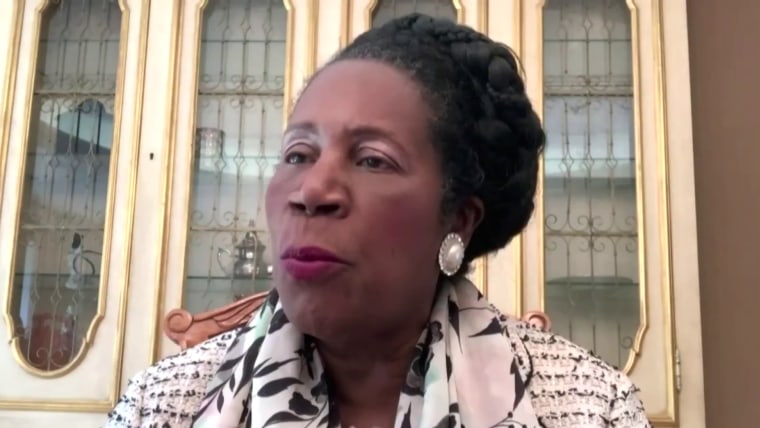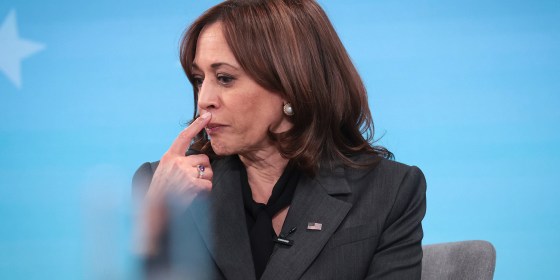Hours after the Supreme Court stripped away women’s constitutional protections for abortion Friday, Vice President Kamala Harris sent out a tweet expressing solidarity with women vocalizing their despair and rage across the country. “I know there are women out there who are afraid,” she wrote. “To those of you who feel alone and scared: I want you to know the President and I are fighting for you and your rights. We are in this fight together.” Attached to the caption, a photograph showed Harris aboard Air Force Two wearing a distressed expression while watching a television screen showing video of protests against the overturning of Roe v. Wade.
The message wasn’t received as she intended.
Commentators online have panned Democrats’ responses as flat-footed and out of touch across the board.
The vice president’s tweet was “ratioed” — critical responses far outnumbered approving ones, with progressives slamming her for looking like a spectator rather than a leader. Activists, pundits and discontented ordinary people piled on, asking what the Democrats’ game plan was to deal with a crisis. While Harris’ photo was meant to convey supportive concern, to many the image of her watching the action on a television on a private jet came across as detached; it was perhaps reminiscent of the infamous photo of President George W. Bush looking down at the aftermath of Hurricane Katrina from Air Force One. “I want you to know: we are watching TV,” actor James Urbaniak quipped in response to Harris’ post.
Harris wasn’t being singled out. Activists and commentators online have panned Democrats’ responses as flat-footed and out of touch across the board, from House Majority Whip James Clyburn’s comment that the court’s decision was “anticlimactic” to Rep. Andy Levin’s posting photos of himself on Twitter doing yoga and saying he was turning “inward” to meditate on the decision to House Democrats’ singing “God Bless America” at the Capitol as protests raged nearby.
What’s going on? The Democrats are failing on two fronts. First, on an affective level, Democratic leaders aren’t expressing, through their language or tone, messages that convey appreciation of how dire the situation is and what a breach in political reality this decision marked. Roe v. Wade was until recently considered a fact of life rather than a fragile legal precedent. This is a rare instance in which the court has overturned an earlier decision that declared a constitutional right — and that right had broad support nationally and overwhelming support among liberals. Now women’s right to bodily autonomy is vanishing across the country. Experts say most states in America are likely or certain to ban abortion post-Roe, and Republicans like former Vice President Mike Pence are salivating over the prospect of a national ban. While people who support abortion rights across the country have found the decision earth-shattering, Democratic leaders haven’t mirrored the outrage of much of their base.
Second, Democrats are failing on a substantive level. Progressive protesters and pundits have complained that Democrats have used the decision as a seemingly routine fundraising opportunity without specifying what they intend to do to actually fix the problem. Rep. Alexandria Ocasio-Cortez of New York published a sharp Twitter thread criticizing Democratic leaders for their vague “Roe is on the ballot” messaging when the crisis extends more deeply than a typical policy battle. As Ocasio-Cortez argues, the crisis is not just about abortion rights, but also the legitimacy and the hyper-reactionary orientation of the Supreme Court itself.
“Leaders must share their plans for Roe AND a rogue court,” Ocasio-Cortez tweeted before proposing more aggressive solutions from providing abortion access in red states on federal lands to expanding the Supreme Court to passing legislation that would weaken the court’s ability to overturn federal legislation.
She called on Democratic leaders to provide more clarity on what they’re willing to do to restore abortion rights and how they plan to get there: “details motivate.”

Some of the details right now aren’t promising. Biden has previously punted on questions about reforming the Supreme Court, and he continues to reject the idea of expanding it. Harris recently declined to comment about whether the administration believes Democrats should seek to eliminate the filibuster to pass legislation in the Senate to protect abortion rights. And most messaging from national Democrats has been disjointed and vague about what the most important focal points should be to have a realistic shot at protecting abortion rights nationwide. (To be fair: One more promising development is that some Democratic congressional committees have recently launched a site to help organize volunteers to fight for abortion rights in various states.)
While measures like expanding the Supreme Court, restraining judicial review or eliminating the filibuster aren’t short-term goals (currently there aren't enough reform-oriented Democrats in the Senate to pull it off), Democratic leaders can make these policy maneuvers more likely in the medium term if they develop a mandate within the party for them. Crucially, adopting a mindset of democracy reform will motivate the progressive activist set, and over the long-term help usher in a policy focus that is not only virtuous but will pay dividends for the left.
The thing many Democratic leaders don’t seem to be absorbing is that increasing numbers of people are sensing that our crisis is bigger than any one terrible policy. The public is now fully in the throes of questioning American political institutions and the capacity for people to pursue the good life in a country that makes democratic governance immensely difficult. The right wants to lean into a blend of authoritarianism and minoritarian rule. But the left needs to respond by making the country more deeply democratic. It's not just Roe on the ballot — it's the country's belief that its institutions work in the public interest.

